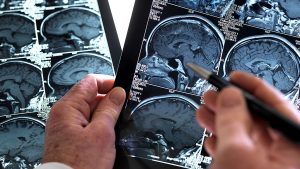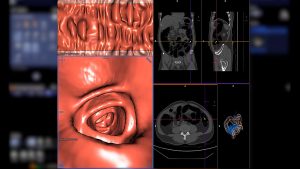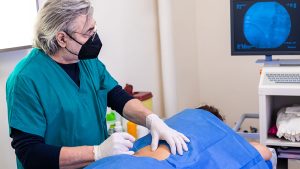Pregnancy and breastfeeding are special times in a woman’s life, bringing both excitement and new health considerations. Among these, breast health remains an important topic, especially when there are concerns or a need for diagnostic imaging like mammograms. Many women wonder if it’s safe to undergo a mammogram during pregnancy or breastfeeding, and understanding the potential risks and alternatives is essential.
The question of mammogram safety during pregnancy or while breastfeeding involves various factors. It’s crucial to know when a mammogram might be recommended, how these stages impact breast tissue, and what alternative imaging options exist if a mammogram isn’t advised. In this article, we’ll cover everything you need to know about mammograms in these unique phases of life.
The Importance of Breast Health During Pregnancy and Breastfeeding

During pregnancy and breastfeeding, breast health should remain a priority. Here’s why it’s important:
- Early Detection: Early detection of any breast abnormalities is critical, regardless of the stage of life.
- Family History and Risk Factors: Women with a family history of breast cancer or genetic predisposition may need additional monitoring.
- Ongoing Breast Changes: The body undergoes many changes, some of which could mask potential issues. Staying vigilant is key.
Given these factors, maintaining a proactive approach to breast health is essential. Knowing when and how to discuss mammogram options with your healthcare provider ensures that you can make the best choice for your situation.
Why Women May Need a Mammogram During Pregnancy or Breastfeeding

There are certain circumstances where a mammogram may be necessary during pregnancy or breastfeeding. These situations highlight the importance of monitoring breast health and taking a proactive approach, even during these unique life stages. Here’s a closer look at when a mammogram might be recommended:
Family History of Breast Cancer
Women with a family history of breast cancer, particularly in close relatives like mothers or sisters, are at a higher risk of developing the disease. This risk may necessitate more vigilant monitoring, including mammograms, to catch any potential issues early. Screening during pregnancy or breastfeeding allows women with a strong family history to maintain awareness and detect any abnormalities as early as possible.
Breast Lumps or Other Changes
Pregnancy and breastfeeding cause significant hormonal changes, which can sometimes result in new lumps or breast tissue changes. While these changes are often benign, it’s essential to rule out any serious underlying conditions.
If a lump is detected, a mammogram can provide a clearer understanding and help distinguish between normal changes and potential concerns. This step can be crucial for women experiencing unusual symptoms, as it enables timely evaluation and peace of mind.
Previous Breast Cancer Diagnosis
For women who have previously been diagnosed with breast cancer, regular follow-up screenings are essential, even during pregnancy or while breastfeeding. Women who have completed treatment may still require routine mammograms to monitor their recovery and ensure there are no signs of recurrence.
Even in remission, pregnancy and breastfeeding can bring about new challenges for breast health, so continuing with prescribed screenings helps maintain a proactive stance on monitoring any developments.
How Pregnancy and Breastfeeding Affect Breast Tissue
Pregnancy and breastfeeding are transformative periods that lead to significant physiological changes in a woman’s body, particularly in breast tissue. These changes can affect mammogram accuracy and the overall approach to breast health monitoring. Here’s a detailed exploration of how pregnancy and breastfeeding alter breast tissue:
Increased Breast Density
One of the most notable changes during pregnancy and breastfeeding is an increase in breast density. The hormonal fluctuations that occur during these stages stimulate the growth of glandular tissue, resulting in denser breasts.
While dense breast tissue is normal, it can complicate mammogram interpretations. Dense tissue can mask tumors, making it more challenging for radiologists to detect abnormalities. Consequently, women with increased breast density may require additional imaging techniques or more frequent monitoring to ensure any potential issues are identified promptly.
Hormonal Changes
The hormonal environment during pregnancy and breastfeeding plays a critical role in breast changes. Elevated levels of hormones such as estrogen and progesterone lead to swelling and sensitivity in breast tissue. These hormonal fluctuations can affect imaging comfort, as many women experience tenderness and discomfort during mammograms.
Additionally, the swelling may lead to changes in breast shape and size, which can alter the effectiveness of mammogram images. For this reason, healthcare providers may suggest scheduling mammograms at optimal times to minimize discomfort and maximize imaging clarity.
Milk Production and Ductal Changes
During breastfeeding, the active production of milk and the engagement of milk ducts introduce additional complexities to breast tissue. The milk ducts become distended and can create areas of increased density within the breast.
This alteration can obscure mammogram images, making it harder to differentiate between normal changes and potential issues. It’s important for healthcare providers to be aware of these changes when recommending imaging, as they can influence the overall evaluation of breast health.
Is it safe to get a mammogram while pregnant?
Can you get a mammogram while pregnant? The question of safety is a common concern for pregnant women. Mammograms involve a low level of radiation, which is usually not harmful to breast tissue. However, the main concern is protecting the fetus.
If a mammogram is deemed necessary during pregnancy, special precautions are taken to minimize radiation exposure, including shielding the abdomen. While generally avoided unless crucial, a mammogram can be performed safely during pregnancy under a healthcare provider’s guidance.
Mammograms While Breastfeeding: What to Expect
Wondering about breastfeeding and mammogram safety? While breastfeeding, women can still undergo mammograms, although there are a few additional considerations:
- Timing: It’s best to schedule the mammogram right after a feeding to reduce discomfort and optimize the clarity of the images.
- Preparation: Expressing milk before the exam can help make the procedure more comfortable and ensure better image quality.
- Post-Procedure Milk: Mammograms do not impact the milk or its safety, so you can continue breastfeeding after the procedure without concern.
The combination of timing and preparation can make a mammogram during breastfeeding more effective and comfortable for breastfeeding women.
When to Talk to Your Doctor

Deciding whether to get a mammogram while pregnant or breastfeeding should always involve a thorough discussion with your healthcare provider. Having open communication with your doctor ensures that you’re making informed decisions about your breast health during these critical times.
Here are some factors to consider:
Symptom Changes
If you notice any changes or have concerns about your breast health, it’s essential to discuss them right away.
Risk Factors and History
Bring up any family history or personal risk factors that may necessitate further screening.
Alternative Options
Ask about other imaging methods if a mammogram is not recommended in your situation.
If you experience persistent symptoms related to breast health, it’s crucial to take them seriously and seek appropriate care. By taking proactive measures and visiting One Step Diagnostic when symptoms arise, you are prioritizing your breast health and ensuring that any potential issues are addressed promptly and effectively.
Alternatives to Mammograms During Pregnancy or Breastfeeding
In some cases, alternative imaging techniques may be recommended instead of mammograms Here are some mammogram alternatives during pregnancy:
- Ultrasound: A safe and effective imaging method for pregnant and breastfeeding women, ultrasound can help detect lumps or abnormalities.
- MRI: Though used less frequently, MRIs can provide detailed breast imaging without radiation exposure.
- Clinical Breast Exam: Performed by a healthcare provider, this exam can help detect any irregularities that may require further testing.
These alternatives offer effective ways to monitor breast health without the use of radiation, making them suitable options during pregnancy and breastfeeding.
Staying Proactive About Breast Health During Pregnancy and Breastfeeding
Maintaining breast health is just as important during pregnancy and breastfeeding as at any other time. If you have concerns about potential breast changes or a family history of breast cancer, speak to your doctor about the best approach to monitoring your health. Whether through mammograms or alternative imaging, staying informed and proactive ensures you can enjoy peace of mind during these unique stages of life.
For comprehensive imaging services and support, consider consulting One Step Diagnostic. Their team of professionals can help guide you through the process of breast health monitoring, providing the necessary screenings and care tailored to your individual needs during pregnancy and breastfeeding. Schedule a visit today.




